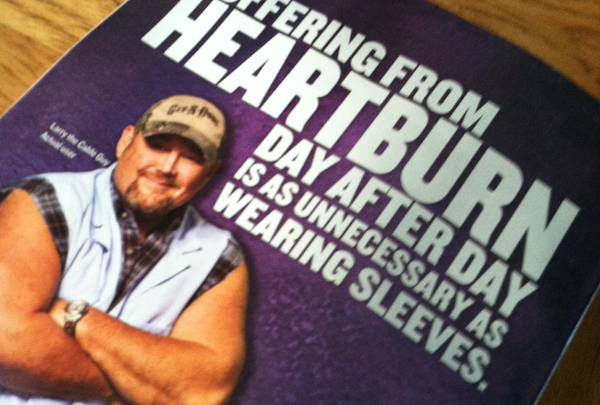
by Tony Russo
 This week’s “Big Picture” was supposed to be anti-advertising but I’m two days past deadline and, frankly, I don’t have it in me. It’s not that I don’t really hate ad culture a lot, I swear I still do, it’s just I’m struggling putting together a cogent argument about why I hate them. It’s kind of like trying to describe why cold-blooded murder is evil — if you don’t already know, I can’t help you. Advertising is axiomatically stupid and hateworthy.
This week’s “Big Picture” was supposed to be anti-advertising but I’m two days past deadline and, frankly, I don’t have it in me. It’s not that I don’t really hate ad culture a lot, I swear I still do, it’s just I’m struggling putting together a cogent argument about why I hate them. It’s kind of like trying to describe why cold-blooded murder is evil — if you don’t already know, I can’t help you. Advertising is axiomatically stupid and hateworthy.
Also, I have a confession to make. Sometimes, I use artificial means to manufacture hate before the Todcast. I mostly do it when I’m tired; it’s not as if my Tuesday evening mood is ever so positive I have to turn it around. My mood-enhancing drug of choice is “She’s in Love with the Boy” by Tricia Yearwood. It goes like this:
I hate this song in so many ways, describing all of them would fill up the whole Internet. Instead, let’s just focus on the reason Wal*Mart country sucks generally: they are superficially maudlin.
Just so we’re all on the same page, “superficially maudlin” means being overly sentimental and being fake about your over-sentimentality. It’s a lot to unpack. If “sentimental” generally connotes manufactured emotion (it does) then “superficially maudlin” is a photograph of plastic emotions. Point is, it’s a textbook example of the degree of evil of which people are capable.
If that seems like too big a leap, let’s take it apart:
The capacity for kindness and love is part of what distinguishes a person as good. In fact, we define bad by a person’s disregard for these traits. That is, in order for something to be cruel, it has to intentionally violate our expectations about kindness and love. Being mean can be accidental (it has to do with small-mindedness), but being cruel takes planning and malice. It is a well-planned betrayal.
Wal*Mart country is possibly the pinnacle of inauthenticity in that it takes what people purely and truly believe in (true love, the human spirit, patriotism), makes a plastic mold of it, photographs it, and sells it to the weak-minded as authentic. This was, of course, true of the hippy songs of the late 60s and early 70s but the argument here must exclude pop music which, by definition, is awful, plastic-y, and only ever accidentally enlightening. Being touched by pop music shows a certain emotional retardation on the part of the listener.
The reason I take aim at Tricia Yearwood’s atrocity is I’m familiar enough with it (I’ve blogged about it before) and her voice on “She’s in Love with the Boy” is the best example of “superficially maudlin” I’ve ever heard. The blog I wrote imagined having it turned into a feature film, ala “Pretty Woman” or “Something to Talk About.” Tommy Lee Jones played “Daddy.” You can imagine the rest.
The question is whether “She’s in Love with the Boy” is merely an example of a song that is mean (stupidly careless), or one that is evil (intentionally uses what is good about people for ill ends).
“She’s in Love with the Boy” is too crafty to be mean. On the surface it is the world’s worst summation of Romeo and Juliet. But the subtext paints a pretty derisive picture of traditional country living, (for many listeners, traditional country living = white trash) holding in contempt everything it is supposedly honoring by making it broad-stroke and cartoonish.
Trisha Yearwood and the rest of the country Wal*Mart crowd do this for their living. It is their job to be reductive and derisive about love and patriotism and the triumph of the human spirit, which is what makes it evil rather than just mean.
So there, I guess I wrote about advertising after all.
Listen to the Todcast here:
Subscribe on iTunes here
